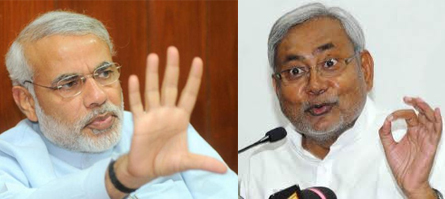
Patna, Jun 12: The Bharatiya Janata Party (BJP) may have resolved one crisis on Tuesday by convincing LK Advani to withdraw his resignation from key party positions, but is now bracing for another trouble.
With Advani relenting on letting Gujarat Chief Minister Narendra Modi continue as the head of the election campaign committee, apparently at the behest of the RSS, the JD(U) has been forced to reconsider its continuance in the opposition National Democratic Alliance (NDA), say sources.
Bihar Chief Minister and JD(U) leader Nitish Kumar, a key ally of the BJP, is opposed to Modi being projected as the PM candidate of the NDA. Modi's anointment as the BJP poll panel chief is a step towards him being named party's PM candidate eventually.
Nitish, whose party is in power in Bihar in alliance with the BJP, held a Cabinet meeting last evening. However, sources said the issue of Modi-Advani tussle did not come up at the meeting.
But that doesn't mean, add sources, that the JD(U) has readied itself to acknowledge 'PM' Modi.
Nitish is reported to have told all MLAs not to leave Patna till June 15. Reason: the party could be forced to take a decision on its continuance in the NDA anytime soon.
Following Modi's elevation on Sunday, JD(U) had said that it was discussing its response to the development. The CM is reported to have begun consultations with senior colleagues on the matter.
JD(U) has in the past said that it will quit its alliance with the BJP if Modi is named the latter's PM candidate.





Comments
Add new comment